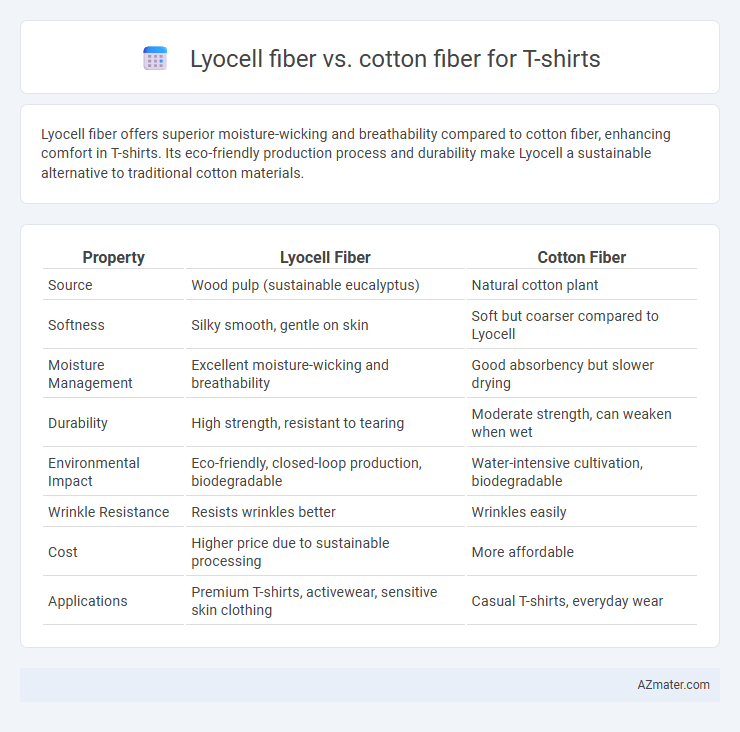Lyocell fiber offers superior moisture-wicking and breathability compared to cotton fiber, enhancing comfort in T-shirts. Its eco-friendly production process and durability make Lyocell a sustainable alternative to traditional cotton materials.
Table of Comparison
| Property | Lyocell Fiber | Cotton Fiber |
|---|---|---|
| Source | Wood pulp (sustainable eucalyptus) | Natural cotton plant |
| Softness | Silky smooth, gentle on skin | Soft but coarser compared to Lyocell |
| Moisture Management | Excellent moisture-wicking and breathability | Good absorbency but slower drying |
| Durability | High strength, resistant to tearing | Moderate strength, can weaken when wet |
| Environmental Impact | Eco-friendly, closed-loop production, biodegradable | Water-intensive cultivation, biodegradable |
| Wrinkle Resistance | Resists wrinkles better | Wrinkles easily |
| Cost | Higher price due to sustainable processing | More affordable |
| Applications | Premium T-shirts, activewear, sensitive skin clothing | Casual T-shirts, everyday wear |
Introduction: Lyocell vs Cotton for T-Shirts
Lyocell fiber, derived from sustainably sourced wood pulp, offers superior moisture-wicking and breathability compared to traditional cotton fibers, making it ideal for high-performance T-shirts. Cotton, a natural fiber known for its softness and durability, remains a popular choice due to its breathable texture and comfort in everyday wear. The comparison highlights lyocell's eco-friendly production process and enhanced fabric strength against cotton's natural feel and widespread availability for T-shirt manufacturing.
Overview of Lyocell Fiber
Lyocell fiber, derived from sustainably sourced wood pulp, offers exceptional moisture-wicking and breathability compared to traditional cotton fiber. Its smooth texture enhances comfort and reduces skin irritation, making it ideal for sensitive skin in T-shirts. Lyocell's eco-friendly production process utilizes a closed-loop system that recycles water and solvents, significantly lowering environmental impact relative to conventional cotton farming.
Overview of Cotton Fiber
Cotton fiber, derived from the seed hairs of the cotton plant, is a natural cellulose fiber known for its breathability, softness, and moisture-absorbing properties, making it a popular choice for T-shirts. Its widespread cultivation in regions such as the United States, India, and China supports a large-scale textile industry focused on comfort and durability. Compared to Lyocell fiber, cotton offers excellent moisture wicking but may be less resistant to shrinking and requires more water-intensive cultivation.
Sustainability and Environmental Impact
Lyocell fiber, derived from sustainably sourced eucalyptus trees, offers a more eco-friendly alternative to cotton by requiring less water and pesticides during cultivation. Cotton farming consumes significant water resources and often relies on chemical fertilizers and insecticides, contributing to soil degradation and water pollution. Lyocell's closed-loop production process recycles solvents, minimizing environmental waste compared to conventional cotton processing.
Comfort and Feel in T-Shirt Applications
Lyocell fiber offers superior moisture-wicking and breathability compared to cotton, enhancing overall comfort in T-shirt applications. The smooth, silk-like texture of Lyocell provides a softer and cooler feel against the skin, reducing irritation and promoting comfort during extended wear. Cotton, while natural and breathable, tends to retain moisture and can feel heavier or rougher, especially in humid conditions.
Durability and Longevity of the Fabrics
Lyocell fiber exhibits superior durability compared to cotton, as its strong cellulose fibers resist wear and tear, making it ideal for long-lasting T-shirts. Cotton, while soft and breathable, tends to weaken with repeated washing and exposure to sunlight, reducing the garment's lifespan over time. The moisture-wicking and abrasion-resistant properties of Lyocell contribute to its enhanced longevity, maintaining fabric integrity and appearance longer than traditional cotton.
Moisture Management and Breathability
Lyocell fiber offers superior moisture management compared to cotton due to its high absorbency and ability to wick moisture away from the skin, keeping the wearer dry and comfortable during physical activity. Its breathable structure allows better air circulation, reducing heat retention and enhancing overall comfort in warm conditions. Cotton fiber, while naturally breathable, tends to retain moisture longer, which can result in a heavier, damp feel during extended wear or intense sweating.
Care Requirements and Maintenance
Lyocell fiber requires gentle washing in cold water and air drying to maintain its softness and durability, whereas cotton fiber is more resilient, tolerating higher washing temperatures and machine drying without significant damage. Lyocell is less prone to shrinking and fading but demands delicate care to prevent pilling and fiber weakening, while cotton towels often need regular ironing due to wrinkling. Both fibers benefit from avoiding bleach and harsh detergents, but lyocell's moisture-wicking properties reduce odor retention, making it easier to maintain freshness.
Cost Comparison: Lyocell vs Cotton T-Shirts
Lyocell T-shirts typically cost 20-30% more than cotton T-shirts due to higher manufacturing expenses and sustainable production processes. Cotton fibers benefit from established agricultural supply chains and mass production, resulting in lower raw material and labor costs. Price variations also depend on fiber quality, with premium organic cotton possibly approaching lyocell costs in some markets.
Which Fiber is Best for Your T-Shirt?
Lyocell fiber offers superior moisture-wicking, breathability, and softness compared to cotton, making it ideal for activewear and sensitive skin. Cotton fiber excels in durability, natural feel, and affordability, suitable for everyday casual T-shirts. Choosing between lyocell and cotton depends on your preference for comfort and performance versus cost-efficiency and traditional texture.

Infographic: Lyocell fiber vs Cotton fiber for T-shirt
 azmater.com
azmater.com